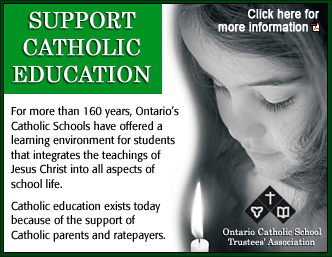INFORMATION
Catholic Education
Catholic schools are maintained parochial schools or education ministries of the Catholic Church. As of 2011[update] the Church operates the world's largest non-governmental school system.Catholic schools participate in the evangelizing mission of the Church, integrating Religious Education as the core subject within its curriculum.
Background
Irish immigration provides the main contribution to the increase in Catholic communities across the globe. The Irish immigration established the revival of Catholicism through movement to countries across Europe, United Kingdom and Australia. Historically, the establishment of Catholic schools in Europe encountered various struggles following the creation of the Church of England in the Elizabethan Religious settlements of 1558-63. Anti-Catholicism in this period encouraged Catholics to create modern Catholic education systems to preserve their traditions. The Relief Acts of 1782 and the Catholic Emancipation Act of 1829 later increased the possibility to openly practice Catholicism in England and to create charitable institutions by the Church.This led to the development of numerous native religious congregations which established schools, hospitals, orphanages, reformatories, and workhouses.
Traditionally, Catholic schools originated as single sex schools. Catholic schools were previously required to depend on school fees and endowments. This ceased and prevented students from enrolling into Catholic schools due to the inability of paying expensive fees.
Purpose
Catholic schools are very distinctive from their public school counterparts in that they aim to focus on the development of individuals as practitioners of the Catholic faith. The leaders, teachers and students are required to focus on four fundamental rules initiated by the Church and school. This includes the Catholic identity of the school, education in regards to life and faith, celebration of life and faith, and action and social justice.
Religious education
The Religious Education as a core subject is a vital element of the curriculum where individuals are to develop themselves: “intellectually, physically, socially, emotionally and of course, spiritually.”The education also involves: “the distinct but complementary aspect of the school's religious dimension of liturgical and prayer life of the school community.”In Catholic schools, teachers teach a Religious Education Program provided by the Bishop. Both teacher and Bishop therefore, contribute to the planning and teaching Religious Education Lessons.
The well-being of Catholic Education - Message from Archbishop Collins
Catholic Education
Catholic schools are maintained parochial schools or education ministries of the Catholic Church. As of 2011[update] the Church operates the world's largest non-governmental school system.Catholic schools participate in the evangelizing mission of the Church, integrating Religious Education as the core subject within its curriculum.
Background
Irish immigration provides the main contribution to the increase in Catholic communities across the globe. The Irish immigration established the revival of Catholicism through movement to countries across Europe, United Kingdom and Australia. Historically, the establishment of Catholic schools in Europe encountered various struggles following the creation of the Church of England in the Elizabethan Religious settlements of 1558-63. Anti-Catholicism in this period encouraged Catholics to create modern Catholic education systems to preserve their traditions. The Relief Acts of 1782 and the Catholic Emancipation Act of 1829 later increased the possibility to openly practice Catholicism in England and to create charitable institutions by the Church.This led to the development of numerous native religious congregations which established schools, hospitals, orphanages, reformatories, and workhouses.
Traditionally, Catholic schools originated as single sex schools. Catholic schools were previously required to depend on school fees and endowments. This ceased and prevented students from enrolling into Catholic schools due to the inability of paying expensive fees.
Purpose
Catholic schools are very distinctive from their public school counterparts in that they aim to focus on the development of individuals as practitioners of the Catholic faith. The leaders, teachers and students are required to focus on four fundamental rules initiated by the Church and school. This includes the Catholic identity of the school, education in regards to life and faith, celebration of life and faith, and action and social justice.
Religious education
The Religious Education as a core subject is a vital element of the curriculum where individuals are to develop themselves: “intellectually, physically, socially, emotionally and of course, spiritually.”The education also involves: “the distinct but complementary aspect of the school's religious dimension of liturgical and prayer life of the school community.”In Catholic schools, teachers teach a Religious Education Program provided by the Bishop. Both teacher and Bishop therefore, contribute to the planning and teaching Religious Education Lessons.
Catholic Education
Catholic Education
Catholic Education
Catholic Education
Catholic Education
Catholic Education
Catholic Education
Catholic Education
Catholic Education
Catholic Education
Muskegon Catholic Schools
The well-being of Catholic Education - Message from Archbishop Collins










No comments:
Post a Comment